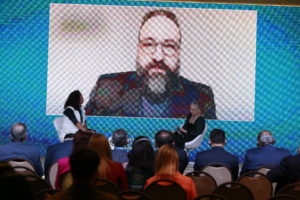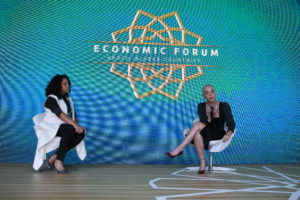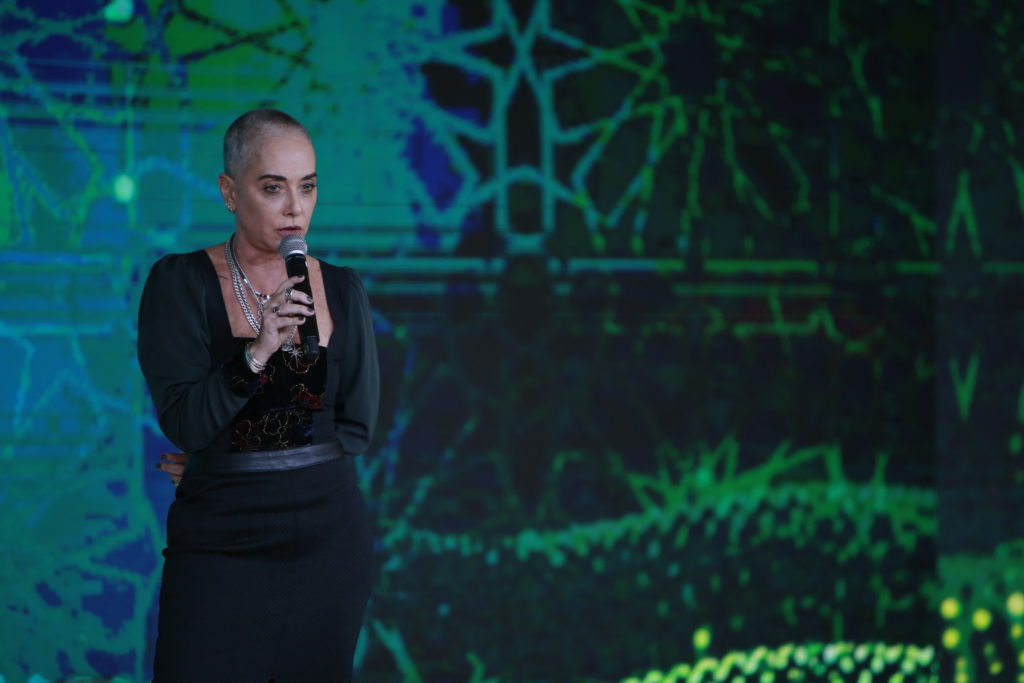São Paulo – After the authorities’ presentations at the 4th Economic Forum Brazil & Arab Countries, the first panel was an invitation to think differently about Business and Innovation, the event’s theme. “Data is not real; facts are!” With this provocation, philosopher and contemporary researcher Anna Flavia Ribeiro (pictured above) began her presentation. She proposed a new standpoint to think about the future and guaranteed: In order to change, it is necessary to strip off beliefs, convictions, and concepts. That is what she called a “state of suspension of convictions.”
She explained the brain never learns at the certainty level: “It only learns when it makes mistakes. It is the mistake that gives us perspective.” Therefore, getting rid of certainties is fundamental. “You have to question, always.” Facts, when broken down into data, can be interpreted, and it is the belief that gives meaning to data, not the other way around. Anna Flavia offers her services to companies when creativity is low and ideas do not come up. That is why she defines herself as “the person in trouble” and adds: “It is a not pleasant place to be, but it’s fascinating.”

The second guest to speak was Caio Esteves, a Place Branding specialist, who began asking a question: “Did the world change after 2020?”. We know it did; the new coronavirus has changed the lives of everyone on the planet, and expressions such as the “new normal” have emerged. But many impacted processes were already underway; they were only accelerated, at work, consumption, and learning.
At this rate, Caio classifies the pre and post-pandemic states with two prefixes, DES and CO. Before the crisis, the DES of decentralization, unpreparedness, and lack of knowledge, among others, prevailed; he emphasizes two: detemporization and dematerialization. Caio participated over the internet from the Brazilian capital city, Brasília, and this served as an example to illustrate what he wanted to say about the ever-changing universe. “It makes no difference whether I am in a hotel in the Federal Capital or Stockholm. The world has become a big non-place, and where we are matters less than how we connect. The place is more than physical territory, and borders are now virtual.”

At this stage, when the pandemic is not yet over, he highlights the prefix CO of collaboration, co-creation, coexistence, and conviviality. “It is the idea that together we are stronger.” He ended his explanation by asking if we are prepared to live in a world of uncertainty and an increasingly dynamic and faster future. And he wrapped up with a provocative question: “Is it possible to solve future problems with ideas of the past?” To innovate, he reinforced what Ribeiro said: “We need to strip off certainties we had about the future.”
The presentation was moderated by Fernanda Baltazar, who’s the director of Institutional Relations at the Arab Brazilian Chamber of Comercer.
The Economic Forum Brazil & Arab Countries is held by the ABCC in partnership with the Union of Arab Chambers, supported by the League of Arab States and sponsored by Travel Plus, Brazil Trade and Investment Promotion Agency (ApexBrasil), Fambras Halal, Embraer, Itaipu Technology Park, Pantanal Trading, Embratur, Khalifa Industrial Zone Abu Dhabi (KIZAD), Cdial Halal, Modern Living, BRF, Egyzone/Am Development, Antika/Openet BV, First Abu Dhabi Bank, Egyptian Financial & Industrial Co. (EFIC), Suez Company for Fertilizers Production (SCFP), Boa Esperança Agriculture Cooperative (CAPEBE), Prima Foods, and Afrinvest.
Here’s more on the Economic Forum Brazil & Arab Countries.
Translated by Elúsio Brasileiro




